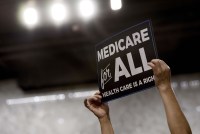Latest KFF Health News Stories
Health Industry Invests Big In Campaign While Pharma Braces For Possible Change In House Leadership
The health sector has given more than $46 million to candidates on the November ballot and drug makers are anxious about how they might fare if the Democrats retake the House. Meanwhile, the campaign trail messaging is not 100 percent accurate when it comes to Democrats’ talk about the number of people who have preexisting conditions, according to a Washington Post fact check, and Republicans are trying to control the debate over health issues by focusing attention on Medicare-for-all.
First Edition: October 30, 2018
Today’s early morning highlights from the major news organizations.
Republicans’ Drive To Tighten Immigration Overlooks Need For Doctors
Many areas in the U.S. depend on foreign doctors, but bitter political arguments over immigration have sown concerns about limited opportunities for these physicians.
With One Hand, Administration Boosts ACA Marketplaces, Weakens Them With Another
The Trump administration gives states more flexibility to get around the health law’s requirements for insurance plans. But at the same time it wants employers to move millions of workers to the insurance exchanges.
GOP’s Latest Campaign Punch On Health Care Relies On Classic Hook: Medicare
Republicans seek to turn the tables on charges that they are undermining preexisting conditions, so they’re hammering the plans championed by some Democrats to expand Medicare.
Editorial pages focus on these health care topics and others.
Media outlets report on news from California, New Jersey, Illinois, Pennsylvania, Ohio, Puerto Rico, Michigan, Missouri, Wyoming, Nevada and North Dakota.
Trump Green Card Proposal Triggers Troubling Health Care Trend Among Some California Immigrants
The San Francisco Chronicle reports on how immigrants at one local clinic are worried that being enrolled in Medicaid will stall their efforts to gain citizenship. Also, the Texas Tribune reports on how one woman, who had been detained at the border, received substandard care.
High Demand But Low Wages: How Workers Who Care For Aging Patients Struggle
Work as a caregiver can be physically demanding and complex, but people in the field often have to take two jobs to make ends meet. “We’re limited in what we pay because of reimbursements,” Paul Randolph, intake supervisor at Excel Home Care, tells The Wall Street Journal.
‘Options Are Dwindling For Many Rural Families’: The Imbalance In Hospitals Closures
Nearly 70 rural hospitals have shuttered since 2013, in a trend that studies associate with states that did not expand Medicaid. In other state hospital news: a three-day strike at five University of California teaching hospitals and a Missouri center reviews its postpartum mental health services.
Gov. Jerry Brown said if President Trump’s proposal goes through, the U.S. will fall behind in the development of electric cars and the health of millions will be jeopardized. Environmental health news comes out of Wisconsin and New Mexico, also.
Best Ways To Avoid The Flu, Beyond The Vaccine
From washing hands to wearing masks, scientists study the most effective strategies for keeping flu infection rates down. In other public health news stories: conflicting nutrition research; Alzheimer’s; and childhood cancer.
Safe Stations, ERs And Other Responses To The Nation’s Opioid Epidemic
Other states are watching how New Hampshire’s “safe stations” approach, which involves setting up access points at which people can seek addiction treatment, is doing. Meanwhile, Maryland hospitals are becoming trailblazers in offering addition treatment in their ERs. And, recognizing that the plague of heroin is not just a big-city problem, NPR reports on how one rural community is reacting.
What A Rash … The High Cost Of An Allergy Test
This installment of the monthly KHN-NPR Bill-of-the-Month feature examines what is behind a very expensive allergy scratch test,
People Over 65 Who Miss Initial Medicare Part B Enrollment Window Can Face Coverage Gaps
Unless covered by an employer plan, people should sign up for Part B in the recommended time frame around their 65th birthday, but there are several problems that keep many from doing so. News on Medicare enrollment season comes out of Minnesota and Arizona, as well.
Shopping For A Plan On The ACA Marketplace? Funding Cutbacks Mean Fewer Guides To Help
Open enrollment begins Thursday on the exchanges created by the federal health law for people who buy their own coverage. But without navigators, some people may find the process of choosing a plan more difficult. Meanwhile, people who get their insurance through their jobs are also often picking plans this time of year and have a number of important choices.
Administration’s Bid To Revamp ACA Exchanges Shifts Decisions To States
Recent policies advanced by the Trump administration will offer much greater leeway to states in determining what type of insurance can be sold through the federal health law marketplaces. Meanwhile, a federal judge suggests that he won’t rule soon on a suit seeking to stop the sale of short-term insurance plans that do not offer comprehensive benefits.
‘Politics Are Really Difficult’ For Trump’s Plan On Medicare Drug Costs
Drug pricing experts say the proposal rolled out by the president Friday to tie what the government pays for Medicare drugs administered in doctors’ offices to what other countries pay for the drugs faces many obstacles. Drugmakers, doctors and some members of Congress are not on board yet. Peter Bach, who studies drug pricing policy, said, “It’s a really tough row to hoe.”
Preexisting Conditions Protections Emerge As Campaign-Trail Flashpoint
Democrats are on the offensive, criticizing GOP claims that they will protect people with preexisting conditions by pointing to the long-term Republican effort to dismantle the Affordable Care Act, which sets out some of those safeguards. But other health policy issues are also in play, including the future of the health care safety net, the opioid epidemic and interesting ballot initiatives.
First Edition: October 29, 2018
Today’s early morning highlights from the major news organizations.





